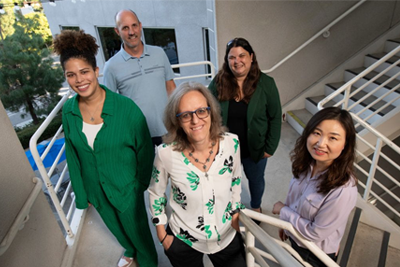NSF funds UC Irvine Project to Improve Climate Science Learning in High Schools
Biological sciences, education and engineering schools team up to create curriculum

Oct. 30, 2023 - The National Science Foundation has awarded an interdisciplinary team from the University of California, Irvine a three-year, $1.6 million grant focused on creating an accessible and equity-centered model for high school environmental engineering education intended to inspire and properly prepare students for careers in this field.
The project, “Fostering Systems Thinking in High School Environmental Engineering Through Engagement of Coastal Communities,” will develop an inclusive curriculum to equip the next generation of environmental engineers with the necessary skills to analyze complex natural and social systems, collaborate with diverse communities and come up with creative solutions to climate change challenges.
Rossella Santagata, UCI professor of education and principal investigator on the grant, said: “In this project, we will utilize a new paradigm of ‘model-validate-iterate,’ where students model aspects of a dynamic real-world system, use data to validate whether their initial presumptions resonate with reality and then create multiple iterations as they explore how that system is changing over time. This is a novel way to teach engineering at the high school level, where typically a ‘design-build-test’ paradigm is emphasized, even though it’s not applicable to climate change engineering solutions.”
The project will examine students’ learning process and formation of critical science agency, as well as co-design the curriculum with local teachers, informal science educators, students from underrepresented populations, and nonprofit and community partners.
“Critical science agency involves learners developing expertise in both science and engineering and their own community contexts and then using that expertise to take justice-oriented action on problems their communities face,” said Jennifer Long, education and outreach coordinator for UCI’s Center for Environmental Biology and a co-principal investigator on the grant. “Using CSA as a foundation will be instrumental in helping the design team to create and study experiences that increase students’ understanding of complex issues related to environmental systems while preparing them with the skills and knowledge to take action on those issues.”
The other co-principal investigator of the interdisciplinary UCI team participating in the project is Hosun Kang, associate professor of education. Symone Gyles, assistant professor of education; Brett Sanders, professor of civil and environmental engineering; and Sara Ludovise of the Orange County Department of Education are included on the grant as collaborators.
“With expanding populations, natural resources stretched to their limits and a rapidly changing climate, there’s enormous need across the U.S. and around the world for investments in public infrastructure that both effectively and equitably meets community needs for clean water, fresh air, safety from extreme events and healthy ecosystems,” Sanders said. “This is the work of environmental engineers, and our aim in this project is to create a high school launch pad for future engineers who are trained to think about problems broadly and about solutions in terms of benefits across many stakeholders.”
Added Santagata: “Our hope is to contribute to fostering resilience in students by preparing them to tackle the impacts of climate change while also learning to advocate for their communities.”
- Cara Capuano and Stacey Wang Rizzo
